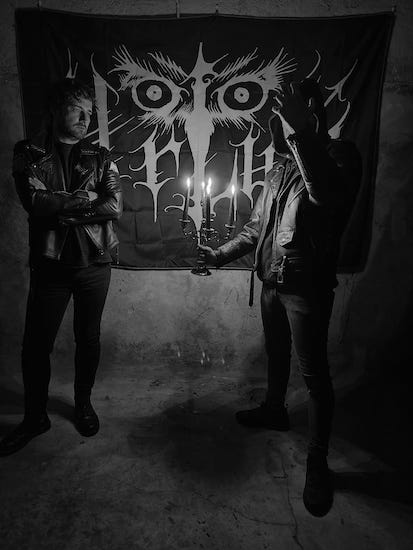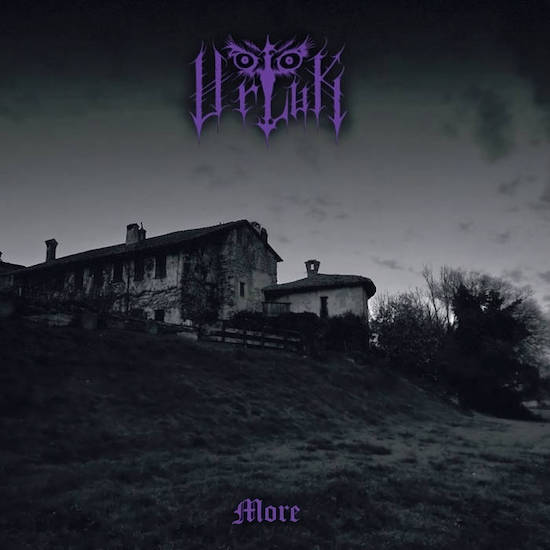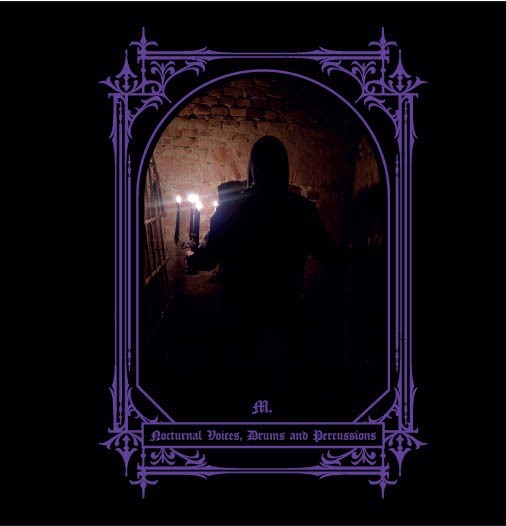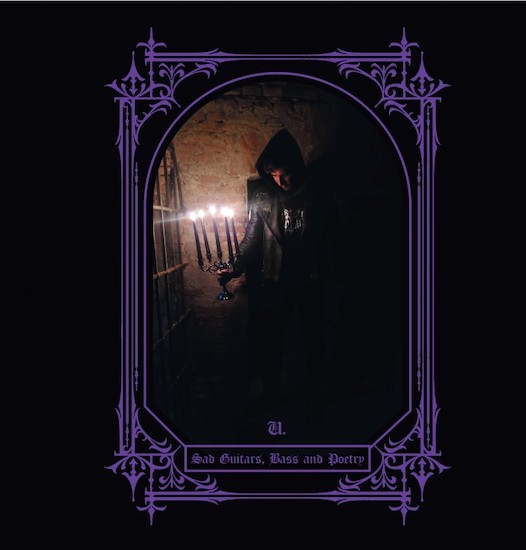
(Today we present an excellent interview that Comrade Aleks conducted with the two members of the Italian black/doom band Urluk, with apologies to all concerned for our delay in publishing it.)
The grim Italian duo Urluk was founded by M. (drums, vocals) and U. (guitars) in 2020. They started their underground career with the EP Loss (2022), followed by the full-length More after a formal one-year-long pause. Five new compositions fit into 34 minutes, slightly ahead of the first release in total duration.
More is the spiritual successor to Loss, and the main motives of these five compositions are identical: loneliness, despair, occultism, and obsession with negative states, clothed in the form of black doom.
It is worth noting that “Urluk” in the Lombard dialect means “tawny owl”, an owl often found in this region and, in the context of the album, associated with abandoned dwellings and forests. In this strange way, the duo demonstrates a close connection with their native land and emphasizes an interest in mysticism and darkness in various forms.
Urluk‘s material, which is still dominated by black metal motifs, really seems to be saturated with energies that exude abandoned houses and ominous ruins. With these images in mind, the duo brings together the raw feeling of black metal and the heavy atmosphere of doom, which truly corresponds to Urluk‘s deep desire to give voice to internal trauma, to express hidden anguish and ill-contained aggression.
The duo’s sound can be labeled as laconic, but Urluk use all their means of self-expression unambiguously. It was my duty to support them, and as result here is the interview with both members of the band.
******
Hi Urluk! How are you? What’s going on in Urluk’s nest?
U: Hi guys. First of all, we want to thank you for the space given to us, Autumn has finally arrived in our lands and our latest work is finally able to release its right energy with these leaden and gray atmospheres.
Both of you started the band in 2020, and since then you recorded the EP Loss and now the full-length album More. What drove you to start Urluk? What kind of vision did you have?
M.: The Urluk creature was born exactly in July 2020 at the behest of me and U. Before then 10 long years of musical inactivity passed since for personal reasons I left Black Oath in 2010, or rather in the middle of the composition of The Third Aeon, what later became their first full-length.
In that decade I felt neither the urge nor the need to play other music in other bands. Then almost by chance, and thanks to the great friendship that binds me to U., we decided to give life to this nocturnal musical creature. I felt that the time had come to get back into the game: the song of the Urluk was calling us and we were ready to follow it.

Look, there were five tracks in Loss (28 minutes total duration) and there are five tracks in More (34 minutes). What makes More the full-length album in your eyes?
M.: When we started composing music for Urluk, we didn’t set ourselves any specific format to debut with. Only later did we realize that the best thing for us, would have been to come out with an EP.
It’s not just the similar length of the two albums or the same number of songs present, both works share the same spirit. More was the right and natural fulfillment of the introspective and musical journey that began with Loss, and we knew that the new album had the maturity necessary to consider it a full-length in all respects; the two works inextricably embrace each other and are part of the same artistic path.
Urluk is a relatively new band, though M. was the drummer in the epic doom act Black Oath from 2006 to 2010. Was M. involved in any other bands since then? And what’s U.’s musical background?
U: My past musical path is quite different from that of my partner M. who we already know. I have been recording and playing live for years but mainly my musical spectrum ranged from old folk, to 1920s delta blues up to shoegaze.
In a certain sense, I believe that the semantics of these old sounds are somewhat similar to black metal: Loneliness, desperation and occultism, the oppression of man by sinister entities.
I can declare without a shadow of a doubt that these sounds also significantly influenced the writing of the lyrics before Loss and subsequently to a greater extent that of More.
How does the occult side manifest itself in Urluk?
U: Urluk in our local dialect means Tawny Owl, a very widespread nocturnal bird of prey in our areas, especially in abandoned farmhouses, and woods.
Originally our intention was to bind ourselves inextricably to something that was local, however maintain a strong bond with our territory, but which also had a strong meaning in our music.
The ancestor of the Owl in Ancient Rome was the striga, a nocturnal bird of bad omen that fed on human blood and flesh. By transfiguring this into our music, the effect it must give is precisely that of wounding, of reopening old scars. In a way, I think this is the occult side of the Urluk.
You live in Milano, but the album has the strong feeling of the abandoned countryside ground: the More artwork, the band’s name, the vibe of your music. How does your environment influence Urluk’s sound?
M.: I take advantage of your question to point out that the cover photos of our albums are part of our territories and were taken by ourselves, as are the remaining photos that can be viewed in the booklet; fortunately, we both live outside of Milan and its unbearable chaos, so the countryside and its abandoned ruins are somehow part of everyday life which has inevitably influenced us in the desolate imagery that we put into our music. These are the places we both feel comfortable and draw inspiration from; it is precisely from these territories that the Urluk emits its nocturnal song.
How does cultural background influence you? Is there more of local influences than abandoned ruins in your music?
U: Let’s say that our music is not very steeped in local or popular traditions; if anything it wants to describe the colors, the atmospheres, and the sense of desolation of our areas. We have both spent a lot of time in these ruined farmhouses and we are more than sure that there are a lot of energies there; in a certain sense they need to want to tell something. We believe we have channeled all of this.
You combined elements of both doom and black metal in Urluk — how does this mix work for you? Was the music first or did you search for the right instrument to channel that vibe?
M.: In our first two works there is a clear mix between black metal and doom metal elements; it’s a mix that has always come out completely spontaneously during the composition phase, and that somehow makes our sound personal compared to the myriad of black metal bands that sound perfectly the same as each other. We felt the need to combine the rawness and ferocity of black metal with the atmosphere and heaviness of doom: we believe that all this was the right way to convey and express our emotions and our inner torment.

It would be logical to suppose that M. would bring some epic doom influences from Black Oath, so why didn’t it happen?
M: To answer your question I could tell you that in my daily life I usually listen to more black metal than doom metal.
But don’t get me wrong, doom is also a very important musical genre for me and I have always listened over the years (and still listen today) to records by classic bands like Black Sabbath, Pentagram, Death SS, Candlemass, Electric Wizard, Paradise Lost, Anathema etc. therefore, just as it is true that everything you listen to directly or indirectly influences you in some way, so it can often happen that you carry some traces of influences from the bands you played with in the past.
However, Urluk and Black Oath at present are two bands with very different characteristics and styles because, as I mentioned before, with Urluk I wanted to give a different musical approach by combining the atmospheres of black metal and doom metal. Have we done it successfully? To the listener the arduous sentence.
You recorded the new material together: M. recorded drums and vocals and U. performed guitars. Are you satisfied with that approach? Didn’t you want to have a bass-player with you or the second guitar?
U: I am fully satisfied with this approach. Currently I don’t feel I need a second guitarist and a bass player.
While in our EP Loss the bass was not present for a precise stylistic reason, so even the guitar had a sparse sound, skeletal, like a dark sound that comes from space. In More the guitars are increased, the bass is very predominant, so much so that I also wanted to develop some riffs as if it were a guitar. In the previous months that accompanied our compositional journey, I had the opportunity to work hard on the riffs with M. on the acoustic guitars and on the bass lines.
As a duo we work very well and we think there is no need to include other figures in the band. Certainly the contribution that occurred during the recording of More by our friends gave a very personal and particular touch to the whole album, but we prefer to remain as we are regarding the compositional process of the musical structures.

There are three guests who helped you recording some parts of More. Carlo Altobelli recorded and mixed the album, so his participation is obvious. What about the others?
M.: Carlo Altobelli and his recording studio were very important for the creation of More: in addition to being our producer, he also participated as a musician in the arrangement of the songs. We are very satisfied with his work, as we are equally satisfied with the other guests on the album who contributed to enriching More with their qualities. They are great friends in our private life as well as excellent musicians who have played in the past, or still play today, in bands of undoubted value.
You see More as a continuation of Loss. Do you see Urluk also as a channel for this melancholy?
M.: Urluk is the arcane representation of the union between man, nature, and human feeling. This musical creature allows us to look inside ourselves with absolute honesty. Urluk is also a manifesto of darkness, melancholy, and desperation, and its night song guides our two souls on a journey of self-discovery.
The songs’ lyrics in More are quite extended. Did you search for a way to speak out your emotions or was it a chance to have more vocals in the album?
U: On a lyrical level, I wanted to express my emotions to the maximum and always give a sense of unity with all the songs. I didn’t worry at all about the length of the lyrics. I really wanted our albums to be concepts where there weren’t just scattered lyrics with no connection to each other, but which had a beginning and an end.
“The Waste Land” by T.S. Eliot helped me a lot in the compositional method, both in giving all the appropriate nuances to the texts and in freeing up the metrics. Furthermore, I wanted to give a lot of material to M. to be able to personalize the singing in the best possible way, and he succeeded very well.
What are your further plans for Urluk in 2023 and beyond?
M.: At the moment we are still busy with the promotion of this new album and I take this opportunity to remind readers that from November second More will also be available in tape format via the Italian label Kold Cave Production.
From the formation of Urluk to the release of More there have been three very hard, intense and profitable years from the point of view of musical productivity, so at the moment we will take a few more months of break and necessary detachment to recharge our energies and find the maximum inspiration to resume the compositions of the new material.
We already have some ideas floating around in my head and we can say right now that we have no intention of endlessly repeating the exact same formulas used up to now. The spirit of Urluk will remain 100% unchanged, as will the distinctive traits of our sound, but we will continue in the search for our personal artistic direction without setting ourselves unnecessary mental limits. As always, once again, we will let ourselves be guided by our instincts.
Thank you for the interview gents! How would you like to finish this conversation in the name of doom, black, and Urluk?
We thank you again for your availability and recommend readers to listen to our new album on a cold, gloomy and desolate day: “Black Doom Melancholy Metal.”
https://www.facebook.com/urlukofficial
https://urluk.bandcamp.com/music
